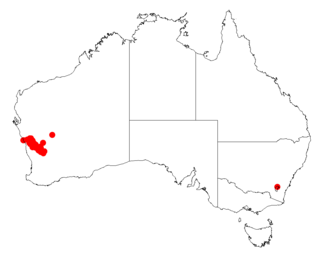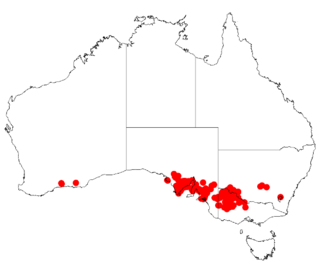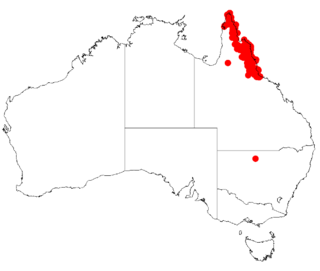
Acacia hammondii, also known as Hammond's wattle, is a tree or shrub belonging to the genus Acacia and the subgenus Juliflorae that is native across northern Australia.

Acacia longiphyllodinea, commonly known as yalgoo or long-leaved wattle, is a shrub belonging to the genus Acacia and the subgenus Juliflorae that is endemic to parts of western Australia

Acacia orthocarpa, also commonly known as Pilbara weeping wattle, needle-leaf wattle or straight-podded wattle, is a shrub or tree belonging to the genus Acacia and the subgenus Juliflorae that is endemic to tropical parts of northern Australia. The indigenous Nyangumarta peoples know it as yartupu.

Acacia ramulosa, commonly known as horse mulga or bowgada wattle, is a shrub belonging to the genus Acacia and the subgenus Juliflorae endemic to arid areas of Australia.

Acacia celastrifolia, commonly known as the glowing wattle, is a shrub or tree belonging to the genus Acacia and the subgenus Phyllodineae native to Western Australia.

Acacia dictyophleba, also known as the sandhill wattle, waxy wattlefeather veined wattle, and spear tree, is a shrub belonging to the genus Acacia and the subgenus Phyllodineae. The Nyangumarta peoples know the plant as Langkur or Lungkun; the Thalanyji know it as Jabandi; and the Pintupi know it as mulyati.

Acacia pycnocephala is a shrub of the genus Acacia and the subgenus Phyllodineae that is endemic to south western Australia.

Acacia halliana is a shrub belonging to the genus Acacia and the subgenus Phyllodineae that is native to parts of south eastern Australia.

Acacia handonis, commonly known as Hando's wattle or Percy Grant wattle, is a shrub belonging to the genus Acacia and the subgenus Phyllodineae that is native to parts of north eastern Australia. In 2008 it was listed as vulnerable according to the Environment Protection and Biodiversity Conservation Act 1999.

Acacia gracilifolia, commonly known as graceful wattle, is a shrub belonging to the genus Acacia and the subgenus Plurinerves native to a small area of central southern Australia.

Acacia quadrilateralis is a shrub belonging to the genus Acacia and the subgenus Phyllodineae native to north eastern Australia.

Acacia rhetinocarpa, commonly known as neat wattle or resin wattle, is a shrub belonging to the genus Acacia and the subgenus Phyllodineae native to southern Australia. It was listed as vulnerable under the Environment Protection and Biodiversity Conservation Act 1999 in 2013.

Acacia rubricola is a shrub belonging to the genus Acacia and the subgenus Phyllodineae native to north eastern Australia.

Acacia ruppii, commonly known as Rupp's wattle, is a shrub belonging to the genus Acacia and the subgenus Phyllodineae native to eastern Australia. It is listed as endangered in the Environment Protection and Biodiversity Conservation Act 1999.

Acacia semilunata is a shrub or tree belonging to the genus Acacia and the subgenus Phyllodineae native to north eastern Australia.

Acacia sertiformis, commonly known as curly-leaved wattle, is a shrub belonging to the genus Acacia and the subgenus Phyllodineae native to north eastern Australia.

Acacia calyculata is a shrub belonging to the genus Acacia and the subgenus Juliflorae that is native to north eastern Australia.

Acacia leptostachya, commonly known as Townsville wattle or slender wattle, is a shrub or small tree belonging to the genus Acacia and the subgenus Juliflorae that is native to north eastern Australia.

Acacia striatifolia is a shrub or tree belonging to the genus Acacia and the subgenus Juliflorae that is native to north eastern Australia.

Acacia barattensis, commonly known as Baratta wattle, is a shrub of the genus Acacia and the subgenus Plurinerves that is endemic to a small area in South Australia where the species is considered to be rare.




















